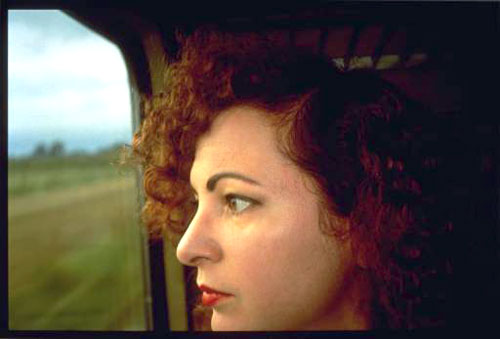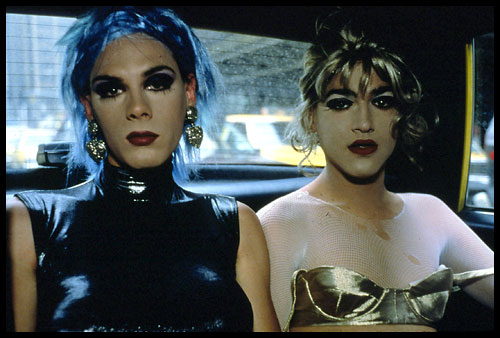Memory, loss, friendship, record

I've been going through a bunch of old videotapes recently. There's a pile by my back wall which is growing smaller as I chuck them out. Occasionally I'll find a programme I want to keep, which I transfer onto the Hard Drive of my PVR, then burn onto DVD at a later date.
It's peculiar sifting through your memories like this. Especially memories mediated through other people's media. Piles of media, some of which spark memories, almost eidetic in nature, based on experiences I was having when I first ingested the images contained on this old analogue magnetic tape. It's quite therapeutic, soothing. Sometimes a few inches short of obsessive and wallowing. But hey, no one is as obsessive and wallowy as an old tranny.
I found a real treasure the other day. A BBC documentary from the mid nineties about the American photographer Nan Goldin, amongst the old comedy, episodes of the X-Files, all that kinda crud that builds up pointlessly and yet informs us in some way.
To be glib for a second, you could say that Nan Goldin invented photo blogging. No, not like that. I mean in the way that she obsessively photographs the world and people around herself, she is like the prototype of a flickr user, way before digital photography, the Internet, became everyday realities for the likes of us.
Goldin has been photographing her circle of friends, a constantly shifting group of social and sexual outsiders, gay and bisexual men and women, drag queens and transsexuals, centred around Rhode Island and New York, since the late 1960s. She says in the documentary, I'll Be Your Mirror, which she co-directed, that she did so initially because her life was so exciting and beautiful that she couldn't bear to forget every moment, every face, each fleeting butterfly moment.
But as her life went on and hardship built on hardship, and AIDS hit the community with its heavy, cold hand in the late 70s, the timbre of her work changed. The subjects were the same, but the work became about memorial, more than memory.
In one devastating sequence in the film, we're presented with a slideshow of all the friends she photographed who were taken by AIDS and other HIV related disease. The photographs are unflinching and unsentimental, showing equal moments of joy and despair. The quantity of loss her circle of friends endured is unimaginable.
This was followed by a montage of Goldin's self portraits, showing the hits she's taken in life as she grows older, from a sassy, knowing-eyed young woman, to the experienced middle-aged artist narrating the piece. By the end I was in tears.
Traces of life found...
Nan Goldin's photography is moving because it is unbeautiful and honest. Her book of photos of transsexuals, drag queens and transvestites, The Other Side, drew huge acclaim a few years ago; it's a far cry from the airbrushed world we feel we'd like to live in, rarely presenting more than a grimily direct view of their lives. This photo of two New York queens in the back of a cab is justifiably famous. It feels unbelievably true to me. I've been those girls, in that cab, so many times in my life.

The moment of reflection before performing, showing out...
But perhaps her greatest work is a book and slide piece called The Ballad of Sexual Dependency, which I was obsessed with in the 90s, when I was at my most extreme as an individual, socially and sexually. It shows her circle of friends, documents the ever shifting trading of sexual needs between them, even shows in horrific detail the growth and breakup of one of her own relationships, which ended with a savage beating which resulted in Goldin in intensive care, having almost lost her sight.
The book felt resonant to me at the time I was in the Six Inch Killaz, but is resonant still now. I read through it last night and was still moved by the legacy of loss that it expresses. Losses we've all gone through in our time.
But which leave the traces of life which we crave so much when we post our pictures to our streams, and pore obsessively into the streams of life's others.
Thanks Nan. Nanks...
Thanks Nan. I enjoyed your film ten years on, and I'm glad I had the opportunity to wallow in the old media pile with you.
Wallowing is good of course, but not half as good as the lightness that comes from taking a box of shitty old videotapes to the dump on Caledonian Road.
Forward!
Notes:
Originally written 1 May 2006 on draGnet 4.0.
comments powered by Disqus